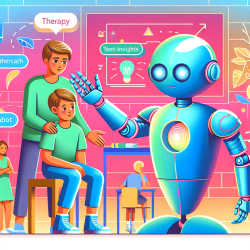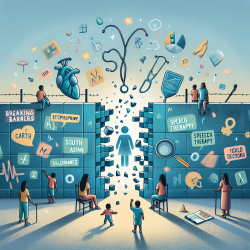The landscape of special education is continually evolving, with advancements in technology playing a pivotal role in shaping how services are delivered. Among these advancements, online therapy services stand out as a transformative solution, offering a new frontier for special education. As a Special Education Director, my commitment to ensuring all students receive the support they need to thrive has led me to explore the potential of online therapy services. This exploration is not just about leveraging technology for the sake of innovation but about addressing the pressing challenges that special education faces today, including therapist staffing shortages and the need for personalized, accessible therapy solutions.
One of the most pressing challenges in special education is the shortage of qualified therapists. This shortage often results in students not receiving the timely and specialized support they need. Online therapy services offer a promising solution by connecting students with qualified therapists regardless of geographical limitations. This not only helps in addressing the therapist shortage but also ensures that students have access to a wider range of specialists who can cater to their specific needs.
Furthermore, online therapy services provide a level of flexibility and personalization that is challenging to achieve in traditional therapy settings. Through these services, therapy sessions can be tailored to the individual student's schedule, learning pace, and preferred learning environment. This personalized approach is particularly beneficial for students with special needs, who often require more individualized attention to thrive.
Another significant advantage of online therapy services is their ability to facilitate a more inclusive learning environment. By integrating these services into the special education curriculum, schools can ensure that all students, regardless of their physical abilities or geographical location, have equal access to therapy services. This inclusivity is crucial for building a supportive and equitable educational environment where every student has the opportunity to succeed.
Despite these benefits, the integration of online therapy services into special education programs is not without challenges. Concerns about the effectiveness of online versus in-person therapy, the digital divide, and ensuring the privacy and security of online sessions are valid and must be addressed. However, the potential benefits far outweigh these challenges, and with careful planning and implementation, online therapy services can significantly enhance the quality of special education.
In conclusion, as we navigate the complexities of special education in the 21st century, it is clear that online therapy services represent a significant step forward. By embracing these services, we can address critical challenges, offer more personalized and accessible therapy solutions, and foster a more inclusive educational environment. As a Special Education Director, I am excited about the possibilities that online therapy services offer and am committed to exploring and implementing these solutions to better support our students.
To read the original research paper, please follow this link: Future Directions in Hearing Aid Research.










